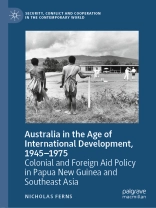This book examines Australian colonial and foreign aid policy towards Papua New Guinea and Southeast Asia in the age of international development (1945–1975). During this period, the academic and political understandings of development consolidated and informed Australian attempts to provide economic assistance to the poorer regions to its north. Development was central to the Australian colonial administration of PNG, as well as its Colombo Plan aid in Asia. In addition to examining Australia’s perception of international development, this book also demonstrates how these debates and policies informed Australia’s understanding of its own development. This manifested itself most clearly in Australia’s behavior at the 1964 United Nations Conference on Trade and Development (UNCTAD). The book concludes with a discussion of development and Australian foreign aid in the decade leading up to Papua New Guinea’s independence, achieved in 1975.
Tabla de materias
Introduction.- 1. “Stone Age to the Twentieth Century”: Trusteeship and the New Deal for Papua New Guinea, 1945-1949.- 2. “By Every Means in Our Power”: The Establishment of the Colombo Plan, 1949-1957.- 3. “New Codes and a New Order”: Papua New Guinean Development in the Hasluck Era, 1951-63.- 4. “Developed, Developing, or Midway?” Australia at the United Nations Conference on Trade and Development, 1964.- 5. “We Should Be Doing More Than We Are”: The Colombo Plan, Papua New Guinea, and the Australian External Aid Review, 1957-1965.- 6. Taking up the “Latest Fashions”: International Development in Flux and the Australian Response, 1965-1975.- Conclusion.
Sobre el autor
Nicholas Ferns is a Teaching and Research Associate at Monash University, Australia. His research has been published in Australian and international journals, including The Australian Journal of Politics and History and Diplomacy and Statecraft.












